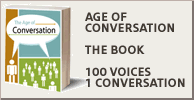
We are delighted that Gary Hirsch will be one of our speakers for our Meet the Makers event in NYC on December 3rd.
Gary set the crowd alight with his improv pyrotechnics at our last event in SF.
Here's a recent email interview I conducted with Gary.
1. There's something about the corporate setting that sometimes stifles creativity-what's that thing and how do you get around it?
For me, Creativity is a big fat word. It means so many things to so many different people. Years ago when I did my first piece of work with an ad agency and someone told me that there was a creative department with creatives in it I was genuinely confused, did this mean the rest of the agency wasn't creative? Seems to me that the label itself isn't very helpful and probably encourages people to keep their ideas close to their chests. I guess that's why I love improv. A great performance is co-created between performers and audience. If you want an audience watching improv and notice where they laugh, it's not at the content. If you transcribed a really funny improv scene and ready it out loud it would not be funny as words coming of the page.So if the content isn't getting the audience to laugh, then what is? I would argue that it's the joy of watching people using other's ideas, seeing people being happy to make mistakes, demonstrating their listening to each other, letting going of personal agendas and being available to be changed. These things are so rare in life and worth paying money to see on stage. To me this is what co-creating looks like and there's real joy in witnessing and participating in it. I deeply believe this can happen anywhere, on state and in a board room, you just have to practice creating the right conditions.
2. What do you believe a controlled and inspired crowd of thinkers can bring to the table that an individual can't?
More heads are better than one, under the right conditions. But instead of listening to me pontificated, try this:
1. Pair up with someone
2. One of you is the storyteller and the other does nothing
3. The storyteller comes up with a made up title of a story that has never been told before
4. They tell the story
Now try this:
1. Pair up with someone
2. One of you is the storyteller, and the other is the word giver
3. Have the word giver give the storyteller a made up title of a story to tell
4. The storyteller begins telling the story. During the story, the word giver will call out random words that have nothing to do with what the storyteller is talking about. For instance, if the story is about a trip to the beach, the word giver avoids helpful worlds like "sand", "waves", "surfboards", etc..Instead you give completely disassociated words like "pudding", "dinosaur", and "Sean Connery"
5. The storyteller has to instantly incorporate the random words into the story. The word giver must wait until the word just given is incorporated into the story before calling out a new one
6. After a while, the storyteller finds an ending to his/her story and then the players switch roles.
This is called Swedish Story Telling (for no apparent or obvious reason that I can see).
Which story is more memorable? Which was easier to tell? A Swedish Story forces new connections. It slams agendas and expectations together and allows the unexpected to emerge. It's created by more than one person. It's co-created (yes, that word again) and it's a hell of a lot more fun to tell.
3. Everyone seems to be searching these days for "breakthrough" thinking and ideas, what do you think they mean?
I have this ridiculously fun job. I get to play with grown-ups for a living using improvisation to help some of the most impressive corporate teams in the world solve seemingly impossible problems, generate breakthrough ideas and turn mistakes into amazing opportunities. But here's the thing, during these high stakes sessions it's the small things that end up creating the biggest breakthrough ideas (I think breakthrough= ideas that excite, surprise and get the group something they want). Someone will get o and change where they are sitting, we will get playful and mess around with something they've been taking too seriously, and we'll impose a ridiculous constraint and see how it shifts the entire dynamic. When we aim directly for a breakthrough idea it becomes a stressful business like trying to squeeze a breakthrough idea from a pore in the middle of your forehead. But it you allow yourself to play with an idea and set the bar low with the goal of coming up with new start points for new conversations that you've never had before about the topic, then (in my experience) the breakthroughs come with more ease and surprise.
More information on Influx's Meet the Makers Conference on December 3rd in NYC, can be found here.
Posted by Ed Cotton
It appears you don't have Flash installed.
